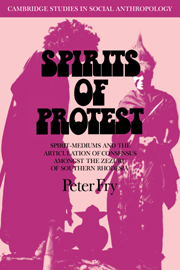 Spirits of Protest
Spirits of Protest Book contents
- Frontmatter
- Contents
- Acknowledgements
- Conventions
- Introduction
- 1 The secular background
- 2 Magico-religious beliefs – the moral significance of explanation
- 3 The sociology of spirit-mediumship
- 4 Zezuru flexibility and Korekore rigidity
- 5 Spirit-mediums in ritual action
- 6 Spirit-mediums and missionaries
- Notes
- Bibliography
- Index
2 - Magico-religious beliefs – the moral significance of explanation
Published online by Cambridge University Press: 08 March 2010
- Frontmatter
- Contents
- Acknowledgements
- Conventions
- Introduction
- 1 The secular background
- 2 Magico-religious beliefs – the moral significance of explanation
- 3 The sociology of spirit-mediumship
- 4 Zezuru flexibility and Korekore rigidity
- 5 Spirit-mediums in ritual action
- 6 Spirit-mediums and missionaries
- Notes
- Bibliography
- Index
Summary
At the same time that Chiota was rapidly incorporated into the political and economic structures developed in the colony of Southern Rhodesia, it was also incorporated into Christendom by the mission activities of the Methodists, Roman Catholics and Anglicans who set up churches and schools throughout the area. However, just as many ‘tribal’ institutions have survived this process, so have the old religious beliefs and practices. Indeed they have done more than merely survive; in recent years they have acquired a new relevance as part of a process of cultural regeneration which accompanied the rise of African nationalism.
The main emphasis of this book is on the political significance of magicoreligious beliefs and I have tended to stress the way in which beliefs are manipulated in concrete situations. Middleton, in his analysis of Lugbara religion, went so far as to claim that Lugbara ‘have no set of interconsistent beliefs as to the nature of man and the world. Their beliefs are significant in given situations and their consistency lies in the way in which they are used in ritual action.’ (Middleton 1960 : 25). The Lugbara and the Zezuru in common with most non-Islamic African societies are lacking in specialised theologists and their magico-religious beliefs are essentially practically orientated notions which are brought into play to account for the many unfortunate events thrown up in day-to-day life. However, this does not mean to say that they do not follow certain basic structural principles. Evans-Pritchard observed that it was impossible for any one Zande to describe his beliefs in witchcraft in their totality.
- Type
- Chapter
- Information
- Spirits of ProtestSpirit-Mediums and the Articulation of Consensus among the Zezuru of Southern Rhodesia (Zimbabwe), pp. 18 - 29Publisher: Cambridge University PressPrint publication year: 1976
